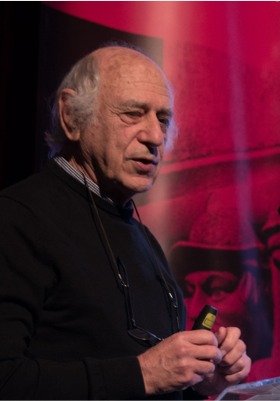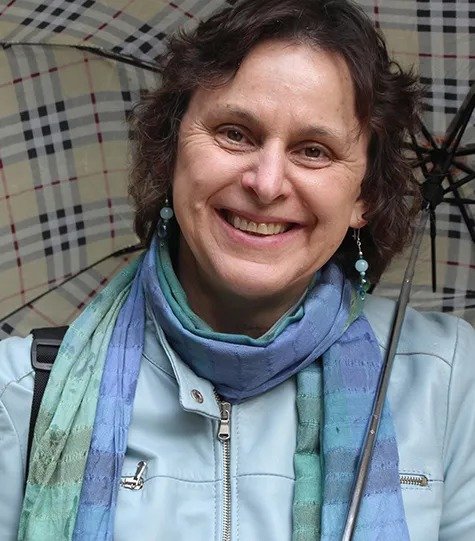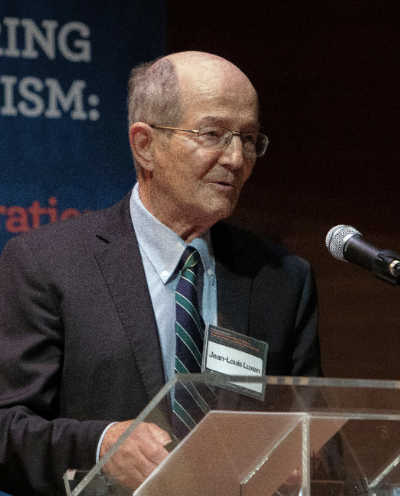This session is a lecture series organised by OurWorldHeritage, in collaboration with the Romualdo Del Bianco Foundation (Italy) as part of the week-long festival “The World In Florence”. You can also attend in the Refectory of Santa Croce, 16 Santa Croce Square in Florence (Italy). Part 1 is moderated by Giovanni Boccardi, Architect (Italy), former UNESCO Culture Sector Office, and part 2 is moderated by Francesco Bandarin, Architect (Italy), Assistant Director General of UNESCO for Culture (2010-2018).
You can follow the event here: www.theworldinflorence.com.
Questions can be sent to
PART 1 - 10.30–11.45 UTC (convert here)
Mike Turner
The Future Metropolitan Heritage: Heritopolis - while the city is more than a group of buildings the metropolis is more than a large city.
According to the UN-Habitat projections a new metropolis will emerge every two weeks over the next quinquennium. This will mean that two thirds of the world’s urban population will be living in a metropolis. The challenges associated with these complexities also offer new perspectives in the coalescing of communities in an urban fragmentation. The multiple identities of urban heritage with socio-economic transformations requires, in the words of the Nara Document, that the communities that created that heritage give way to the responsibilities of those that are currently its managers. The Historic Urban Landscape Recommendation considers that heritage will go beyond the historic ensemble thereby including the synoecism of rural forms and patterns providing for spatial sustainability in a symbiotic relationship. Urban and rural community linkages go beyond the mantra of culture and nature in providing livelihood and well-being; the metropolis may provide for these physical, ethereal and digital linkages.
Prof Michael Turner is a practicing architect, faculty member of the Bezalel Academy of Arts and Design, Jerusalem. He serves on many professional-academic bodies providing expert advice over a range of subjects focusing on urban heritage and its support for sustainable development. His European and Israeli research activities cover issues on education, heritage, peace, urban design and resilient cities, contributing to academic fora and professional meetings over the world. With over two decades of involvement in UNESCO, inter alia, he has accompanied the debate on the Historic Urban Landscapes since its inception. He is currently special advisor to the Director of the World Heritage Centre and accompanying the Modern Heritage of Africa initiative – MoHoA. Michael is active in other global activities including the UNDRR Resilient Cities Programme, one of the initiators of the OurWorldHeritageourworldheritage civil society network and is coordinating the UNHabitat UNIversity partnership metrohub consortium on Heritopolis – heritage and the metropolis.
Giovanni Fontana Antonelli
The future of Mosul: prodromes of a post-conflict reconstruction|
The Old City of Mosul did not receive any attention as a World Heritage site until it was destroyed. It was included in the Tentative List of Iraq only in August 2018, thirteen months after its liberation. Its cultural heritage was deliberately destroyed by ISIL/Da’esh in 2014, while its historic urban fabric was almost wiped off the map in 2017. The people of Mosul started to reconstruct their city right after its liberation. The old city today looks like a huge building-site where dozens of plots are undergoing reconstruction. The “Initial Planning Framework for the Reconstruction of Mosul” paved the ground to future plans for urban recovery and reconstruction. The “Revive the Spirit of Mosul” initiative launched several projects towards the rehabilitation of its Historic Urban Landscape and its most significant landmarks. Year 2072: The Old City of Mosul is fully reconstructed, following Dresden, Warsaw, Rotterdam or Le Havre after WWII or more recently Saigon, Mostar, Timbuktu. Mosul might not follow any of the past examples, but will be certainly reborn from its ashes.
Giovanni Fontana Antonelli is an architect and urban planner specialized in the safeguarding of cultural heritage, historic towns and cultural landscapes. From 1998 to 2013 he worked as a UNESCO Programme Specialist at the World Heritage Centre and in various countries of Africa and the Middle East, and from 2014 to 2019 as a Senior Consultant for various United Nations agencies, especially in conflict and post-conflict contexts. His projects have been awarded international prizes, such as the Melina Mercouri International Prize for the safeguarding and management of cultural landscapes in 2011 and nominated for the Aga Khan Award for Architecture in 2013 and 2016. Speaker at international conferences and events, he is the author of more than 70 scientific articles and book chapters on historic cities, cultural landscapes and management of cultural heritage sites. He is currently Chief Executive Officer of the non-profit organization Archi.Media Trust.
Patricia M. O’Donnell
The future of World Natural Heritage: Our Local and Global Landscape Heritage: Focusing on Planetary Rights and Adaptive Change Management
This presentation will explore the status of the planet in terms of protection, issues and threats presenting the notion of Planetary Rights, for all the members of the living communities of Earth. Our global landscapes, shaped by nature and culture, are under myriad threats. Bringing adaptive change management to the forefront of landscape heritage and community, the contribution will address what is needed to make progress in the face of rapid and unpredictable change at the local level. Exploring these topics and good practice examples leads to potential engagement for the heritage community through collaboration toward positive actions. This presentation provides timely perspectives to understand the challenges of our times and to apply effective practices in heritage management, inclusion, and climate action toward Planetary Rights.
Patricia M. O’Donnell serves the heritage community as OurWorldHeritage board president. She is a landscape architect and urban planner, founder of Heritage Landscapes LLC, Preservation Landscape Architects and Planners in 1987. As leader of over 600 professional planning and implementation projects, she sees the accelerating pace of global heritage impacts and the need for adaptive change management. Having contributed to the continued vitality and resilience of a legacy of public landscapes, O’Donnell seeks to apply resilience to these cherished landscape heritage places. O’Donnell’s work aligns to the UN SDGs 2030 Agenda, New Urban Agenda, and the latest scientific findings recognizing a foundation in gratitude for our beleaguered planet, to act locally on universal objectives.
Jean-Louis Luxen
World Heritage Inscription and interpretation of Sites of Memory
The past and present living conditions of people connected to a heritage site should be more taken into consideration, both in the evaluation process and in the management of the site. Besides industrial sites or human settlements, a particular attention is required when dealing with Sites of Memory. Heritage places related to recent conflicts or violation of human rights under dictatorship, slavery, colonialism, discrimination against indigenous people and cultural minorities. With a distinction between sites where the memorial aspects are dominant, with physical remains of limited value (to what extent do they relate to the World Heritage Convention?) and sites where the memorial dimension is accompanying outstanding physical heritage values. How can an inclusive interpretation present the historic significance of the site and make it a place of remembrance and peaceful reflection in order to promote dialogue and a culture of peace?
Jean-Louis Luxen holds a PhD in Law (Louvain) and a Master Degree in Economics (Stanford). As a senior civil servant, he was in charge of Cultural affairs, involved in Heritage conservation since the 1970’s, in Belgium and at the Council of Europe. As Secretary General of ICOMOS, from 1993 to 2002, he took part in the preparation of the Nara Conference and in the implementation of the World Heritage Convention. From 2008 to 2013, he acted as Senior Legal Expert of the Euromed Heritage programme for the strengthening of the institutional and legislative framework. From 2007 to 2019, he was a Board member of the International Coalition of Sites of Conscience. In 2018, he was asked by the World Heritage Centre to chair the Working Group on “Interpretation of Sites of Memory”. He is Professor Emeritus at the University of Louvain.
PART 2 - 11.45–13:00 UTC (convert here)
Christina Cameron
What future of the WH Convention?
After 50 years, it is time to shift the focus from listing sites to protecting and conserving them. Furthermore, while respecting the role of various international committees and organisations, it is essential to recognize that conservation happens at the local level. OurWorldHeritage focuses on co-learning to share best practices for conservation and sustainability among all members. If this is the future for World Heritage, we need to mobilize to break down administrative and disciplinary silos in order to implement a holistic approach to looking after these special places. We also need to break down the hierarchy of implementation processes that shut out the voices of civil society, communities and Indigenous Peoples. By clarifying and simplifying language and reducing geopolitical interests, the future of the World Heritage Convention could see people working together for the common good of humanity. The choice is ours.
Christina Cameron (Canada) held the Canada Research Chair in Built Heritage at the University of Montreal from 2005 to 2019 where she directed a research program on heritage conservation. She previously served as a heritage executive with Parks Canada for more than thirty-five years. She has worked with the World Heritage Convention since 1987, chairing the Committee in 1990 and 2008 and co-authoring Many Voices, One Vision: The Early Years of the World Heritage Convention (2013). In 2007, she received the Outstanding Achievement Award of the Public Service of Canada, the country’s highest recognition for public service. She was appointed to the Order of Canada in 2014 and received the Prix du Québec Gérard-Morisset in 2018 for her contributions to heritage conservation in Canada and abroad. She is a founding member of OurWorldHeritage.
Jad Tabet
The future of heritage in conflict zones
Three-Quarters of a century ago, UNESCO was founded in the aftermath of World War II to promote peace between nations and establish the intellectual and moral solidarity of mankind. In the context of a global age, our world witnesses the return of the evils of the past and new forms of conflicts emerged as a direct result of sectarian and ethnic violence. Cultural heritage as an expression of communities’ values has become a direct target of armed conflicts and is subject to deliberate destruction. Protecting this heritage constitutes a crucial element for the preservation of cultural identities and plays a major role in the recovery process.
Jad Tabet is the former President of the Lebanese Order of Engineers and Architects and of the Arab Union of Architects. He is the Honorary president of ICOMOS Lebanon and former Member of UNESCO World Heritage Committee An architect and planner working between Beirut and Paris, he is the author of several academic publications on war and reconstruction, and on the relationship between heritage and modernity.
Tokie Brown
The future of community building
The holistic approach to cultural heritage analysis in the context of social responsibility is an element of pursuing long-term sustainability of a community and its environment. It also originates the necessity to analyse governing strategies, processes and key indicators that breeds transparency and inclusion. The presenter will draw on examples from African communities. The optimal linkage of these three key factors: economic, ecological, and social, through ethical cultural sensitivity, all in the shared interest of building community engagement. The communal activities mentioned above are useful for societies as a whole, which demands creative innovations while still upholding sustainability principles. In this way, communities achieve their fundamental purpose of existence, i.e. their communal objectives, uphold human and ecological values which is expressed through a well being framework and transparent public awareness steeped in the common good of the community.
Dr. Tokie is a Scientific Member of the Scientific Committee, Graduate Programme in Cultural Heritage Studies at the University of Nova Goricia, Slovenia. Co-Founder, Foundation for the Preservation of Cultural Heritage in Nigeria. An Expert/voting Member of the ISCCL and represents Nigeria on ICOMOS-IFLA. Dr. Tokie also works as a Heritage Architect and Cultural Economist with Merging Ecologies Studio which maintains a bespoke sustainable and heritage infused design development solutions in Africa.
Meetali Gupta
Future for Young Heritage Professionals
Strategies of preserving heritage for the future generations is a well known discourse revolving around the techniques of conservation, heritage identity and sense of belongingness. While countless challenges within this perimeter lay ahead, it is not only important to address heritage in need, but also to continue building on an environment for young professionals to embark in this quest. What does it take to motivate the present generation to protect the heritage? To develop a professional career in heritage? And to devote their expertise to its adoption in today’s time? If we take the quest of sustainable approaches at heart, it is about time that we collaborate on an ecosystem that attracts young minds to its upkeep.
Meetali Gupta is an Architect from Delhi, India currently pursuing an advanced masters course on "World Heritage Studies" in Cottbus, Germany. Over the past 3 years, she has been a part of a variety of heritage organisations including Blue Shield Germany, Europa Nostra Germany, European Heritage Volunteers and European Heritage Times, serving in the capacity of a heritage assistant, heritage researcher, project coordinator, media coordinator and technical instructor. As part of the coordination committee member for ESACH (European Students Association for Cultural Heritage), she manages the university groups across Europe. She also served as a research and communications assistant for European Historic Houses, Brussels. Currently, she works as a heritage research assistant for the faculty of architecture in the Brandenburg University of Technology, Cottbus Germany. Her interests lie in built cultural heritage and the dissemination of activities revolving around heritage crossing borders.








